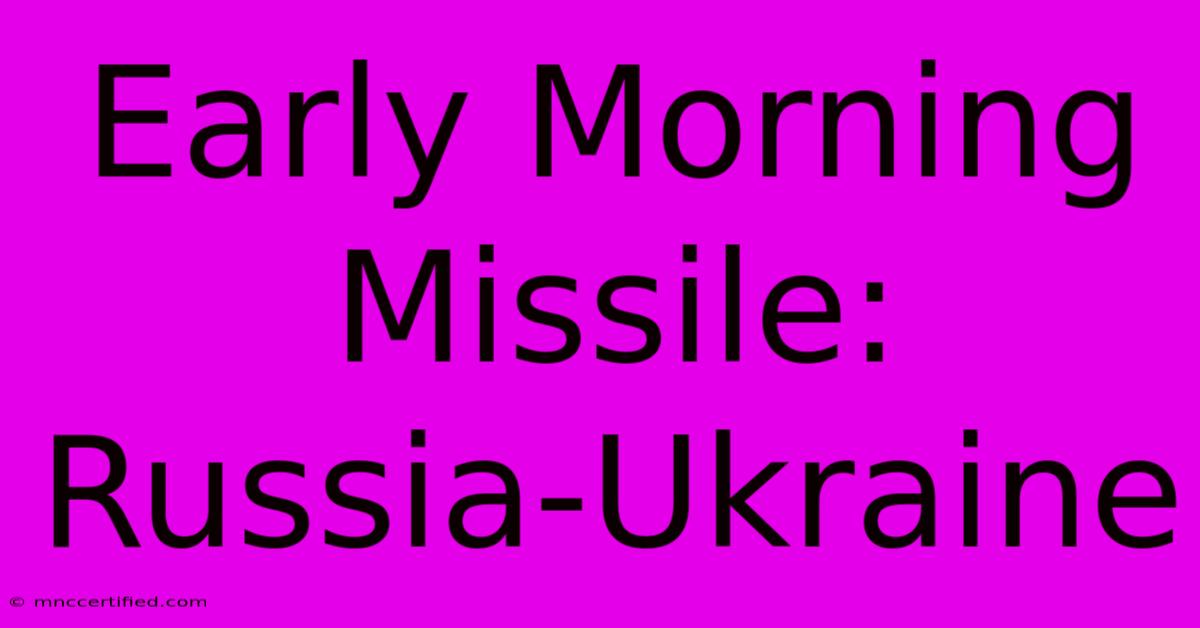Early Morning Missile: Russia-Ukraine

Table of Contents
Early Morning Missile Strikes: Escalating Tensions in the Russia-Ukraine Conflict
The ongoing Russia-Ukraine conflict continues to escalate, with recent events highlighting a concerning pattern of early morning missile strikes targeting civilian infrastructure and residential areas. These attacks underscore the brutal reality of the war and raise serious questions about the future trajectory of the conflict. Understanding the context of these strikes is crucial to comprehending the evolving dynamics of the situation.
The Pattern of Early Morning Attacks
The deliberate targeting of civilian areas, particularly in the early hours of the morning, is a disturbing tactic employed by Russia. These attacks exploit the vulnerability of sleeping populations, maximizing casualties and psychological impact. The timing suggests a calculated attempt to inflict maximum terror and disruption. This strategy goes beyond simple military objectives, suggesting a broader aim to demoralize the Ukrainian population and undermine their resolve.
Targeting Civilian Infrastructure
The targets of these early morning missile strikes are not always purely military. Critical infrastructure, such as power grids, water supplies, and heating systems, are frequently targeted, leaving civilians without essential services, especially during the harsh winter months. This deliberate targeting of civilian infrastructure constitutes a war crime under international law. The destruction of these systems leads to widespread suffering and exacerbates the humanitarian crisis already unfolding in Ukraine.
Psychological Warfare
Beyond the immediate physical destruction, these early morning missile strikes represent a potent form of psychological warfare. The constant fear and uncertainty created by the unpredictable nature of these attacks profoundly impact the mental health of the Ukrainian population. The disruption of daily life, the loss of loved ones, and the constant threat of further attacks contribute to a climate of fear and anxiety. This psychological toll is a significant factor in the overall impact of the conflict.
International Response and Condemnation
The international community has overwhelmingly condemned these attacks. Numerous countries have voiced their outrage at the targeting of civilians and called for an end to hostilities. International organizations, such as the United Nations, have also issued strong statements condemning the attacks and highlighting the urgent need for humanitarian aid. However, translating condemnation into effective action remains a challenge.
Sanctions and Diplomatic Efforts
In response to Russia's aggression, various international sanctions have been imposed. These sanctions target the Russian economy and aim to pressure Russia to cease its military actions. Diplomatic efforts are ongoing, but significant progress towards a peaceful resolution remains elusive. The effectiveness of these measures in deterring future attacks remains a subject of debate.
The Humanitarian Crisis
The early morning missile strikes significantly exacerbate the already dire humanitarian situation in Ukraine. Millions of Ukrainians have been displaced from their homes, facing shortages of food, water, shelter, and medical care. The destruction of infrastructure further complicates the delivery of humanitarian aid, making the situation even more precarious. International aid organizations are struggling to meet the overwhelming needs of the affected population.
Long-Term Implications
The long-term implications of these attacks extend far beyond the immediate destruction and casualties. The psychological trauma inflicted on the Ukrainian population will have lasting consequences. The rebuilding of destroyed infrastructure will require significant resources and time. The conflict's impact on the Ukrainian economy and society will be felt for years to come.
Conclusion: The Need for Peace
The early morning missile strikes in Ukraine represent a grave escalation of the conflict and a stark reminder of the devastating human cost of war. The international community must continue to condemn these attacks unequivocally and redouble its efforts to find a peaceful resolution. Addressing the humanitarian crisis and supporting the Ukrainian people are paramount. Only through sustained international pressure and a commitment to peace can we hope to end this brutal conflict and prevent further suffering. The future of Ukraine and regional stability hinges on a concerted effort to achieve lasting peace.

Thank you for visiting our website wich cover about Early Morning Missile: Russia-Ukraine. We hope the information provided has been useful to you. Feel free to contact us if you have any questions or need further assistance. See you next time and dont miss to bookmark.
Featured Posts
-
Life Insurance For Truck Drivers
Nov 21, 2024
-
Gold Bond 5 8 Fire Shield Type X
Nov 21, 2024
-
Insurance Companies Lynchburg Va
Nov 21, 2024
-
Juice Wrld Fortnite Concert Skin And Items
Nov 21, 2024
-
Is Fluoride Covered By Insurance
Nov 21, 2024